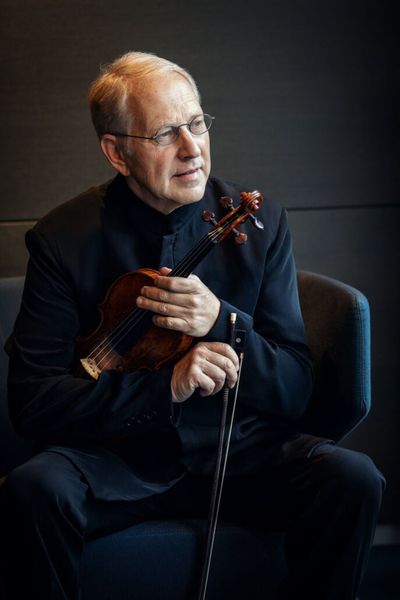Violin virtuoso Shlomo Mintz makes a return trip to Spokane to perform with GU symphony

Imagine going through your daily mail and finding, amidst all the junk, an invitation from a friend: “You are cordially invited to a small gathering at my home next Monday. Live entertainment will be provided by Beyoncé.”
Or by Elton John, or any other artist far too great ever to appear at the home of any friend of yours.
Ridiculously improbable? Yet that is very like what happened four years ago in Spokane, when Kevin Hekmatpanah, professor of music at Gonzaga University and director of the orchestra there, announced that Shlomo Mintz would appear as soloist with his orchestra in a performance of the Mendelssohn Violin Concerto.
Now he’s done it again. Mintz is appearing with Hekmatpanah and the Gonzaga Orchestra in a performance of Jean Sibelius’ Violin Concerto in D minor on Monday evening.
It is true, of course, that Beyoncé and Elton John are both better known than Shlomo Mintz, even among those who are familiar with classical music. But to those for whom violin music plays an important part, the mention of Mintz’s name elicits reverence for the figure who first lit up the musical firmament in the early 1980s, when, barely into his 20s, he entered into a period of recording and performance that is the stuff of legend.
He appeared to burst fully formed onto the scene with an infallible technique and a tone that sent professionals scurrying to violin repair shops to see what could be wrong with their fiddles, and, what is more, with musical judgment and insight so penetrating and mature to suggest an artist three times his age.
Mintz, a Russian-born Israeli, made his professional debut at age 11 with the Israel Philharmonic Orchestra, and made his debut at Carnegie Hall at 16. Two years later, he picked up the baton, beginning a parallel career track as a conductor.
In scarcely more than a decade, Mintz – along with his record company, DG – had given the musical public a veritable library of reference recordings of all but one of the great violin concertos of the 19th century (the Tchaikovsky concerto being the exception). This is in addition to magnificent performances of chamber music and solo works, crowned by the unaccompanied Sonatas and Partitas of J.S. Bach, a set that has served as a source both of inspiration and despair for budding violinists and seasoned professionals ever since.
The reasons why the torrent of recordings and concerts that characterized his work in the ’80s and ’90s has since slowed to a trickle are best known to Shlomo Mintz, himself. One suspects, however, that it was due in part to a nature that wished to pursue the spirit of music wherever it led him, be it to conducting, judging competitions, serving as artistic director of a music festival, or especially to teaching, which seems to be the ultimate goal of all his activities. He may have judged that such diversification made better use of the great gifts he received at birth than concentrating on the creation and maintenance of a “great career.”
When asked in The Spokesman-Review four years ago why someone who has performed with orchestras in Vienna, Berlin and London would wish to do so with a university orchestra in Spokane, he replied, “The joy of music is the most important factor here, more than anything else.”